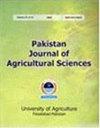外源渗透物的补充改善了干旱胁迫下大豆的生理特性、抗氧化酶活性和脂质过氧化反应
IF 0.6
4区 农林科学
Q3 AGRICULTURE, MULTIDISCIPLINARY
引用次数: 2
摘要
大豆被认为是需要充足水供应的作物之一,特别是在生长阶段,以实现最大产量。与其他豆科作物相比,干旱胁迫降低了大豆的生产力和产量。随着时间的推移,地方大豆品种由于对非生物胁迫缺乏抵抗力,其产量潜力逐渐下降。有必要探索将干旱对大豆的影响降到最低的途径。为此,本研究通过盆栽试验,评估了外源叶面添加10mm和20mM的脯氨酸和甘氨酸甜菜碱渗透剂对干旱胁迫下大豆的各种物理参数、氧化胁迫改善和破坏性脂质过氧化作用的终止。施用50%田间容量的水分胁迫,播种3种不同基因型大豆,包括Ajmeri、Rawal和faisal大豆。这导致所有三种大豆基因型在代替水分胁迫条件下的形态生长和生理反应降低。水分胁迫还降低了脯氨酸和甜菜碱的含量,降低了抗氧化酶的活性。它还促进了大豆脂质过氧化过程。浸渍处理通过提高植株的生理反应和抗氧化酶活性来增强植株对干旱胁迫的抗性。通过MDA和H2O2含量测定,它还降低了脂质过氧化程度。叶面施用脯氨酸20mM时,与其他基因型相比,Ajmeri基因型的效果最为显著。因此,利用外源渗透物特别是脯氨酸有助于提高大豆产量,缓解干旱胁迫效应本文章由计算机程序翻译,如有差异,请以英文原文为准。
Exogenous osmolytes supplementation improves the physiological characteristics, antioxidant enzymatic activity and lipid peroxidation alleviation in drought-stressed soybean
Soybean is considered among the crops that demand a plentiful water supply, particularly during the growth phase to achieve maximum production. The drought stress adversely reduces the productivity and yield of soybean as compared to other legumes crops. With the passage of time, the local varieties of soybean have declined their yield potential because they have no resistance against abiotic stresses. There is a need to explore the avenues that minimize the impact of drought on soybean plants. In this regard, a pot experiment was performed to assess the exogenously applied foliar supplementation of proline and glycine betaine osmolytes @10mM and 20mM on the various physical parameters, oxidative stress amelioration, and cessation of damaging lipid peroxidation that indicates the beneficial effects of osmolytes supplementation in drought-stressed soybean. The water stress was applied at 50% of field capacity sown with three different genotypes of soybean including Ajmeri, Rawal, and Faisal-Soy. This leads to the reduced morphological growth and physiological response in all three soybean genotypes in lieu of water stress conditions. The water stress also reduced the content of proline and glycine betaine and reduced the activity of antioxidant enzymes. It also enhanced the process of lipid peroxidation in all genotypes of soybean. The osmolyte treatments enhanced the resistance against drought stress conditions by improving the physiological response and antioxidant enzymatic activity. It also decreased the degree of lipid peroxidation evaluated through MDA and H2O2 contents. The most significant results were found in the Ajmeri genotype as compared to other genotypes at 20mM foliar application of proline. Therefore, it is suggested that the use of exogenous osmolytes especially proline is helpful in enhancing soybean production and alleviating the drought stress effects
求助全文
通过发布文献求助,成功后即可免费获取论文全文。
去求助
来源期刊

Pakistan Journal of Agricultural Sciences
AGRICULTURE, MULTIDISCIPLINARY-
CiteScore
1.80
自引率
25.00%
发文量
18
审稿时长
6-12 weeks
期刊介绍:
Pakistan Journal of Agricultural Sciences is published in English four times a year. The journal publishes original articles on all aspects of agriculture and allied fields.
 求助内容:
求助内容: 应助结果提醒方式:
应助结果提醒方式:


